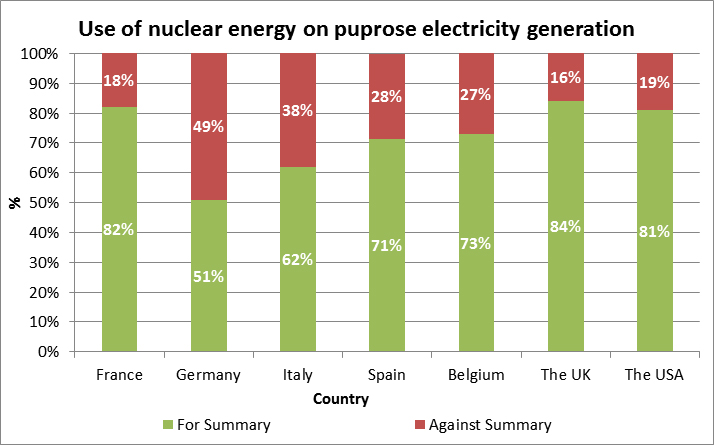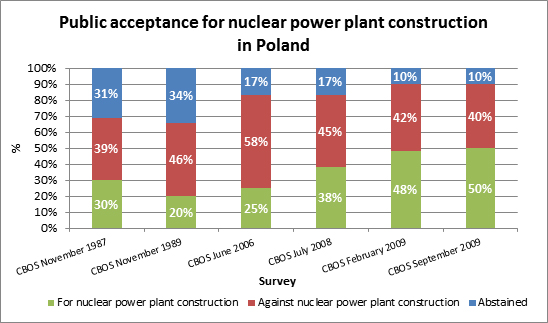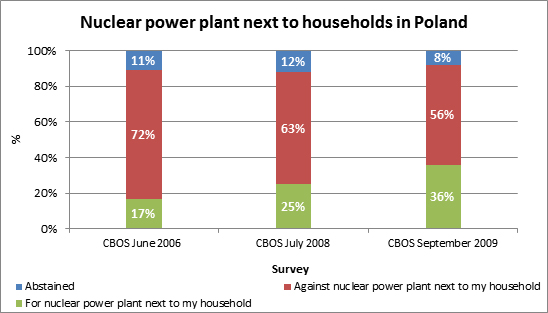
PUBLIC ASPECT
Public attitude to nuclear power industry
Before Fukushima breakdown
The concept of public acceptance for the nuclear industry, before Fukushima outage was not been raised very often. It was not required then. Since Chernobyl disaster, nothing serious had happened, so public attitude had been rather positive, and it had had upward trend. Especially in countries, where nuclear units have been operating. The public attitude in several countries is presented in the Figure no. 41.

Source: Own development based on "Nuclear energy and recycling opportunities: the perceptions in Europe and the United States", Areva and TNS Sofres survey, 1 March 2010, http://www.tnsglobal.com/research/key-insight-reports/2B57187E150344D5861ACCB3F58D1437.aspx, [118]
Small opposition in nuclear power plants development is present even in France, where electricity supply system is based on nuclear energy. Public acceptance is high in Italy where nuclear industry was abandoned after Chernobyl and there are plans to establish it again in near future. Interesting is indecisiveness of society in Germany, because they have large number of operating reactors. Poland has similar plans to Italy. Polish government abandoned nuclear programme after Chernobyl. Nuclear power plant was already under construction in Zarnowiec then.

Source: Own development based on J. S z c z p a n s k a, "O problemach energetyki. Komunikat z badan", Centrum Badania Opinii Spolecznej CBOS, August 2008, Warszawa,[119] D. C i e p e l a, "Coraz wiecej Polaków godzi sie na budowe elektrowni jadrowej w swoim sasiedztwie", 26 January 2010, http://elektrownia-jadrowa.pl/146.html, [120]
Figure no.42 presents how public attitude of Polish, has been changing since 1987 (Chernobyl outage). It can be noticed that, as a country who is trying to introduce nuclear industry, public overall acceptance is rather high. Different results are brought by surveys, when the question about nuclear power plant next to households is asked. Only 36% of people want to live near to nuclear facilities. Nevertheless, progress between 2006 and 2009 is noticed.

Source: Own development based on J. S z c z p a n s k a, "O problemach energetyki. Komunikat z badan", Centrum Badania Opinii Spolecznej CBOS, August 2008, Warszawa,[119] D. C i e p e l a, "Coraz wiecej Polaków godzi sie na budowe elektrowni jadrowej w swoim sasiedztwie", 26 January 2010, http://elektrownia-jadrowa.pl/146.html, [120]
Lithuania is a country that has been devoid of Ignalina nuclear power plant due to EU Accession Treaty. Lithuanians prefer nuclear energy than other forms of energy generation. 64 % of them will choose nuclear system, 25 % - gas, 16% - oil, 14% - coal. They also support (in 70 %) involvement of Latvia, Estonia and Poland in reactor construction at their territory.
-
Nuclear power industry|
Technology|
The electricity supply system aspect|
Economics|
Environment|
Public aspect|
Future|
Legislation|
References|

